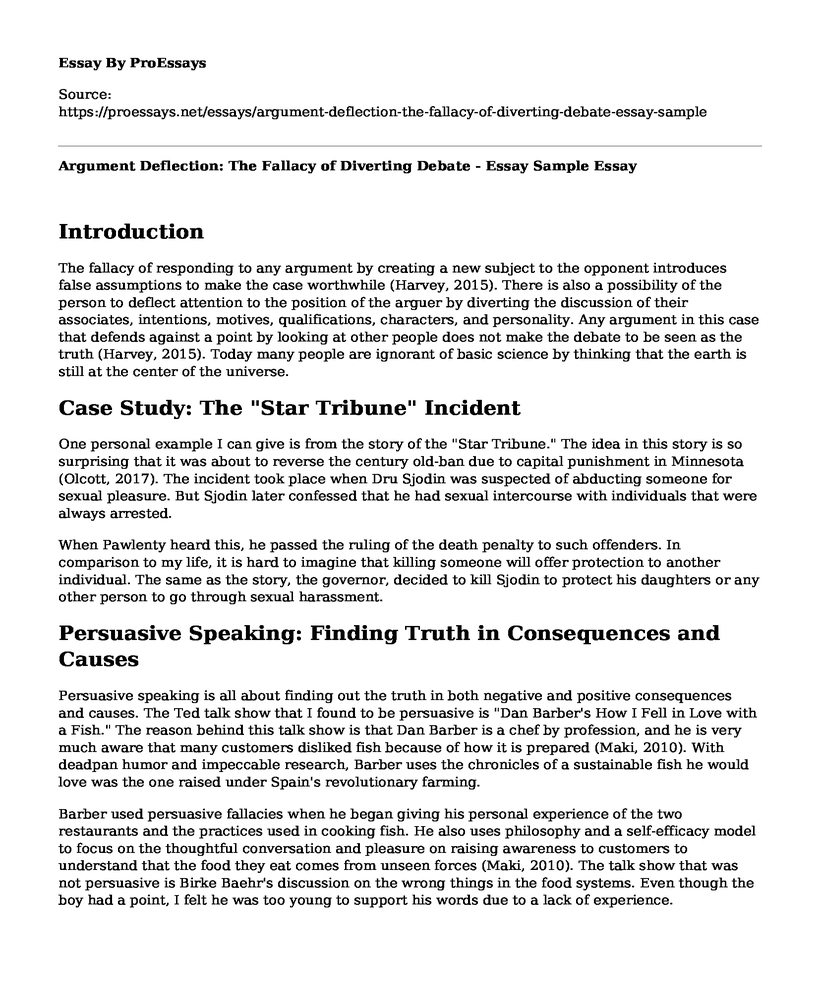Introduction
The fallacy of responding to any argument by creating a new subject to the opponent introduces false assumptions to make the case worthwhile (Harvey, 2015). There is also a possibility of the person to deflect attention to the position of the arguer by diverting the discussion of their associates, intentions, motives, qualifications, characters, and personality. Any argument in this case that defends against a point by looking at other people does not make the debate to be seen as the truth (Harvey, 2015). Today many people are ignorant of basic science by thinking that the earth is still at the center of the universe.
Case Study: The "Star Tribune" Incident
One personal example I can give is from the story of the "Star Tribune." The idea in this story is so surprising that it was about to reverse the century old-ban due to capital punishment in Minnesota (Olcott, 2017). The incident took place when Dru Sjodin was suspected of abducting someone for sexual pleasure. But Sjodin later confessed that he had sexual intercourse with individuals that were always arrested.
When Pawlenty heard this, he passed the ruling of the death penalty to such offenders. In comparison to my life, it is hard to imagine that killing someone will offer protection to another individual. The same as the story, the governor, decided to kill Sjodin to protect his daughters or any other person to go through sexual harassment.
Persuasive Speaking: Finding Truth in Consequences and Causes
Persuasive speaking is all about finding out the truth in both negative and positive consequences and causes. The Ted talk show that I found to be persuasive is "Dan Barber's How I Fell in Love with a Fish." The reason behind this talk show is that Dan Barber is a chef by profession, and he is very much aware that many customers disliked fish because of how it is prepared (Maki, 2010). With deadpan humor and impeccable research, Barber uses the chronicles of a sustainable fish he would love was the one raised under Spain's revolutionary farming.
Barber used persuasive fallacies when he began giving his personal experience of the two restaurants and the practices used in cooking fish. He also uses philosophy and a self-efficacy model to focus on the thoughtful conversation and pleasure on raising awareness to customers to understand that the food they eat comes from unseen forces (Maki, 2010). The talk show that was not persuasive is Birke Baehr's discussion on the wrong things in the food systems. Even though the boy had a point, I felt he was too young to support his words due to a lack of experience.
Biases and Decision Making
Biases can ruin a person's decision. After asking my friend, he discovered that one preference that I was fully aware of but denied that it affects my activities is the framing effect. As a student, this is one fascinating bias that I take advantage of. In a nutshell, the way I frame things negatively and positively affects how I process information in my head. The only way I can stop these habits is by trying and understand what I am taught instead of searching for the good and bad of it. For instance, if the professor asks us to read a particular chapter concerning a specific topic, then I need to understand it instead of trying to reverse the meaning.
Conclusion
The idea of discovering my biases can also give me the chance to interact well with my classmates. Most of the time, I judge them quickly before they finish their stories. As a result, we end up no agreeing in any discussion, especially if I also know the story. Therefore, stopping this habit will strengthen relationships not only in school, but even when we are at home. The bad habits will also help me to stop doubting everything I am told.
References
Harvey, H. (2015). The fallacy of the opt-out clause argument. Bmj, 1(1), 45-88. doi: 10.1136/bmj.h5257
Maki, O. (2010, August 25). TED Talk: How I fell in love with a fish - Bio-Logical Capital. Retrieved from https://www.biologicalcapital.com/blog-roll/2017/1/25/ted-talk-how-i-fell-in-love-with-a-fish
Olcott, J. (2017). Chaos in the Tribune. International Womens Year, 1(1), 104-187. doi: 10.1093/oso/9780195327687.003.0014
Cite this page
Argument Deflection: The Fallacy of Diverting Debate - Essay Sample. (2023, May 28). Retrieved from https://proessays.net/essays/argument-deflection-the-fallacy-of-diverting-debate-essay-sample
If you are the original author of this essay and no longer wish to have it published on the ProEssays website, please click below to request its removal:
- Essay Sample on US Border Officers Use Tear Gas to Attack a Migrant Caravan
- Essay Sample on Feminist Movement
- Animal Abuses Essay Example
- Essay Example on Guns in Colleges: Impact on Learning & Security
- Saving the Bees: The Need for Animal Protection and Preservation - Research Paper
- Effective Treatment for Toxic Shame and Alcoholism: Systematic Review - Essay Sample
- Legalizing Marijuana in All States - Essay Sample







